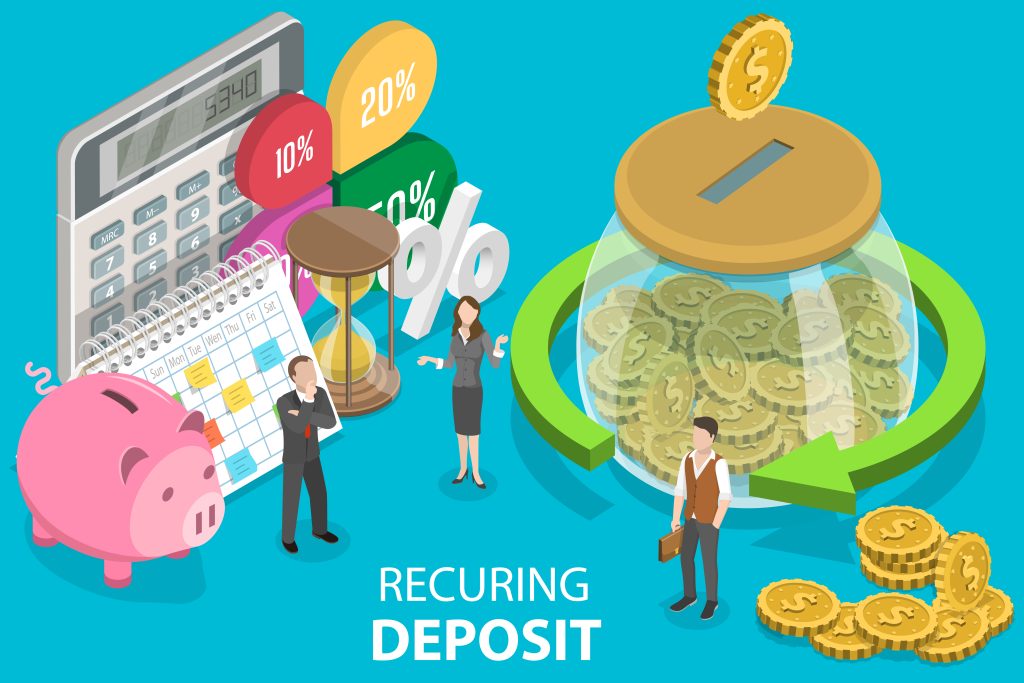A fun fact: the full form of RD in Hindi is aavartee jamaa – आवर्ती जमा. Of course, since banks don’t work like school, nobody will stop you at the door to ask you, “RD ka full form?”; plus, you can always say recurring deposit – that’s what all the cool kids are calling it in the banks anyway.
So what exactly is an RD, and why do Indians love it as an investment option so much? In 2020, Indians invested over 1.1 trillion rupees in recurring deposits in the Post Office alone. Strap in: we’re about to tell you everything you need to know about RD full form recurring deposits – and why you should consider getting one.

What is RD (Recurring Deposit)?
Recurring Deposits, or RDs for short, are a special type of term deposit provided by Indian banks. It is an investment tool that enables investors to make consistent deposits and receive substantial returns. Thanks to the monthly deposit aspect and an interest component, it frequently offers users and individuals flexibility and ease of investment.
But it’s important to understand that RDs differ from Fixed Deposits/FDs. RDs are generally flexible. The owner of an RD account has the option to invest a set sum each month while receiving a respectable income. RDs are a great combination of investment and saving tools.
Recurring Deposit Accounts are offered by the majority of the country’s main banks, and they typically have terms between six months and ten years, giving customers the flexibility to select the length of time that best suits their needs. The interest rate, once set, does not fluctuate throughout the period, and upon maturity, the person will get a lump sum payment that covers both the regular investments and the interest gained.
How Does a Recurring Deposit Work?
What is RD? The full form of RD in the bank terms is a recurring deposit, and as the name suggests, it’s a kind of investment plan wherein you regularly deposit a fixed amount of money in your deposit account. Thus the term recurring!
RDs work in a pretty straightforward manner: when you open an RD account, you agree to deposit a set amount of money every month at a specific date for a fixed period of time known as the investment tenure. The bank allows you to earn interest on this deposit at a fixed rate during that time. Once the time is up, you get all your money back along with interest it has earned. Neat right?
RDs are great for when you have a salary and are trying to get some long-term financial planning done, mainly because you know exactly what you’re going to get and when you’ll get it. Want to travel to Greece on your thirtieth birthday? Want to get married in five years? Done! When you set up an RD, you regularly set aside money for your future goals.
Components of a Recurring Deposit
Since now you know what is RD, next comes what exactly does a recurring deposit entail? If you’re wondering what RD is and its features, here’s what you can keep in mind before you invest in one.
- RDs earn interest on a fixed rate set by your bank at the time of account opening; this means your investment is not market linked and is perfectly safe. There are no fluctuations to worry about: you will get exactly what you were promised at the end of your investment term.
- RDs are a great way to get into a regular saving habit, allowing you to reach your financial goals relatively easily.
- RDs can be as small or as large as you like: you can choose to set aside Rs. 100 a month to Rs 10,000 a month.
- Because you get fixed deposit interest rates, your RDs will earn higher interest than your savings account. If you’re sure you won’t immediately need this money, RDs are a great way to earn some returns while parking your money in a safe investment option.
- We say be sure about not needing the money because many banks and NBFCs don’t allow premature withdrawals from RDs; once the money is deposited, it’s usually locked in until maturity.
- RDs – and FDs – can be used as collateral for loans from the bank. This is a great backup plan to have in case you find yourself in dire need of funds suddenly; the interest rates on these loans are pretty low too.
- RDs can be set up automatically from your bank account, so you don’t have to worry about remembering the exact date you need to put the deposit in the RD.
How to Open a Recurring Deposit Account?
Most banks and NBFCs – and even your quaint local post office! – offer RD accounts; we weren’t kidding when we said RDs are one of the most popular investment options in India. So you’ve decided to take the plunge and open one. Here’s how:
If you’ve decided you’re happy with the RD terms offered by the bank you already have an account, the process is as simple as heading to your net banking portal and choosing the RD option. You can then put your specific details in – RD amount, tenure, etc. – and create one in minutes. If you want to get some fresh air or fancy a drive, you can also head to your nearest branch and simply ask them to make you an RD. They’ll give you a form, which you fill with the details above – and hey presto, you are the proud owner of a shiny new RD now.
If you’ve decided the grass is greener with other banks, the process is a little more complicated, because you’ll need to provide identification to prove you are who you say you are. Your bank already knows you, so they skip this step. Submit your KYC documents – Aadhaar card or passport, PAN card – to the bank or NBFC along with the RD form, and you’re good to go!

Who Should Invest in a Recurring Deposit?
As with all investment-related questions, there is no one-size-fits-all best option. However, RDs, generally speaking, are great for people with a salary. It allows you to invest and save consistently in a way that ensures your money is safe from market fluctuations while earning higher interest than what your savings account can offer.
The timeline of your goals will also be a key consideration as you make your investment choices. If your goals are short-term, it makes sense to choose safer, less volatile options like RDs, while the potential for returns becomes more important with long-term goals.
Finally, income will also be a key consideration as you choose the best investment scheme for yourself. How much are you earning? Do you have people dependent on you for financial support? How much disposable income do you have on a monthly basis? How much can you spare to invest? Regardless of your age, if you have to support your family on your income, your investment goals as well as your risk appetites will change.
Features of Recurring Deposits
- Recurring Deposit programmes are designed to help people develop a regular saving habit
- The minimal deposit amount frequently varies from bank to bank. You could start investing with just ₹1000
- The minimum deposit time is six months, and the maximum deposit period is ten years
- The interest rate is the same as that for a fixed deposit. As a result, they are higher than savings accounts
- Premature/early withdrawals, depending on the bank/financial institutions, can be made before the maturity period under certain circumstances
- Standing Instructions, which are often requests made by the customer to the bank to credit the RD account each month from his or her savings or current account, can be used to fund recurring deposits.
Benefits of Investing in Recurring Deposit
- RD is a basic investment scheme, making it easier for novice investors to comprehend. One can develop a regular saving and investing habit by investing in RDs.
- Short, medium or long-term investments can be made using RDs. The minimum tenure ranges from six months to five years. Additionally, for some institutions, the minimum investment amount is typically ₹10. However, it often costs ₹100 for public sector banks and ₹500 to ₹1000 for private sector banks.
- The RDs are very liquid. You can take money out of an RD account whenever you choose, but the bank will charge you a modest fee for doing so.
- You can use your RD account as collateral for a loan (such as a personal loan or an education loan) and receive 80–90% of the deposit value in the form of a loan. RDs offer a flexible option that allows users to invest different amounts (beyond the minimum amount) as needed.
Key Takeaways
- The full form of RD is recurring deposit, which works exactly as the name promises. You deposit a fixed amount of money monthly – recurrently – in an RD account, and it merrily earns you returns on interest.
- RDs are a great way to inculcate a saving habit and plan for both long- and short-term financial goals.
- Terms offered for RD accounts vary across banks and Non-Banking Financial Companies; to find the best interest rate, your best bet is to compare across institutions.
Eligibility Criteria for Opening a Recurring Deposit
If you are wondering what is RD account eligibility criteria, we are glad to inform you that anyone can open an RD account. Anyone over the age of 10 years can open a recurring deposit account. Government institutions, firms, corporations, commercial enterprises, etc., are also eligible for investing in the savings scheme.
Documents Required to Open Recurring Deposit Account
- An application form
- Passport size photograph of the applicant
- ID and address proof
- KYC documents
Recurring Deposit Calculator
The lump sum payment and interest are paid after the RD deposit reaches maturity. Since the interest rate is fixed for the duration of the RD, calculating the potential earnings from investing in one is simple. It remains constant, in contrast to some investment products, making it a desirable savings plan.
Like any other type of savings account, the interest rate on RDs varies from bank to bank. Interest rates in Indian banks range between 3.5-8.5%. Seniors’ RD accounts have an interest rate a little higher than those of normal accounts. Most banks give older citizens an additional rate between 0.25% and 7%.
To calculate what is RD amount you will receive upon maturity, you can use the multiple recurring deposit calculators available online.

RD Interest Rates
| Particulars | Details |
| Regular RD Savings Scheme | 7% to 8% |
| RD Schemes for Minors | Can be equivalent to or higher than the regular RD scheme |
| RD Savings Scheme for Senior Citizens | 7.5% to 9.25% per annum |
| NRE/NRO RD Schemes | 5.50% per annum |
Renewals and Withdrawals of Recurring Deposit
Renewals
- RD accounts can be renewed after maturity. However, it is often considered a new deposit account altogether. Hence, the interest rate is done on the basis of the current rates
- In most cases, the renewal is for the same tenure as chosen before maturity. For example, an RD account with a lock-in period of five years can only be renewed for another five years
Partial Withdrawals
- Banks do not allow for a partial withdrawal from RD accounts
- However, certain banks might offer an overdraft or loan against the deposit as collateral
- On the other hand, RD accounts with a Post Office do offer partial withdrawal after one year of maintaining the deposit
Premature Withdrawal of Recurring Deposit
- In case of a premature withdrawal, investors will receive interest for the deposit period, but 1% penalty would be levied by the bank
- It would also make you ineligible for any other additional benefits that you may be applicable otherwise
Taxation On Recurring Deposits
Investment in bank RD is not qualified for tax exemption under Section 80C of the Income Tax, 1961. As a result, investing in any of the bank’s recurring deposits is not tax deductible. However, under Section 80C of the Income Tax Act of 1961, a post office term deposit with a duration of five years is eligible for a tax deduction. Therefore, investing in post office RDs entitles one to claim tax benefits of up to ₹1.5 lakhs.
The interest income that one earns on a recurring deposit scheme is taxable. The applicable tax rate is based on the tax slab rates for individual investors. To determine their taxable income, one can utilise an income tax calculator. At the time of maturity, investors receive their original investment plus interest. Additionally, bank RD interest is compounded every three months. To calculate the maturity amount from an investment in recurring deposits, utilise a recurring deposit calculator.
Pros and Cons of a Recurring Deposit Account
Still, want to be sure before you decide to take that walk to your nearest bank branch? We got you. Here are a list of the pros and cons of getting an RD.
- Planning for financial goals: Recurring deposits are solid option for when you have a salary and are trying to save for long term financial goals – a luxurious vacation, a picture perfect wedding, your dream home, and so on.
- The savings: Given the way they work, RDs make it a rule for you to save every month without excuses or negotiation. You don’t have to rely on your own sense of discipline – which may crumble in the face of a trip to the mall – to save money. Standing instructions with your bank will ensure that you set aside that pre-decided amount of money every month without fail.
- Interest rates: RDs offer fixed deposit interest rates that are safe from the fluctuating ravages of the economy and world politics. You don’t have to worry about how the market is doing and can sleep soundly knowing your money is safe in your RD, merrily earning the interest it was set at the time of opening.
- Loans against RD: If you ever need money in an emergency, RDs make reliable collateral to get a loan with low-interest rates.
Although the advantages are substantial, there are some drawbacks to investing in RDs as well.
- Taxes: Many adults’ worst nightmare, interest earned from RDs is subject to taxation based on the bracket you fall in.
- No liquidity: Once you open an RD and put the money in, you can’t access the money until maturity. While this is great for your savings, it puts you in a tough spot if you need the money in an emergency.
- No flexibility: Once you open an RD, you can’t change its terms. You are essentially bound to the promise you made of the set amount at the specified date. Again, great for discipline but terrible for changing circumstances and emergencies.
Important Factors to Check Before Applying for RD
Although recurring deposits are a secure investment choice with a largely assured return on investment, it is advisable to take the following aspects into account before opening an account for recurring deposits.
Interest Rates Available:
Banks offer interest rates that vary from bank to bank and across various term lengths. Various banks often provide recurring account holders an interest rate that runs from 3.5% to 8.5% p.a. The chosen deposit tenure affects the return rates. The rates on medium-term deposits are often the highest. Long-term deposits often have slightly lower interest rates because the depositor will make a larger profit overall.
Term Period:
Recurring Deposit term periods are divided into three categories:
- Short-Term Tenure: Lasts from 6 months to 1 year.
- Medium-Term Tenure: Lasts from more than 1 year to 5 years.
- Long-Term Tenure: Lasts from more than 5 years to 10 years.
Conclusion
What is RD? As we have seen, RD is an excellent investment option to start out with on a salary. One of the wisest pieces of advice when it comes to investment planning is to start investing early! People often get discouraged from starting at all because they think they need to find the perfect time to start investing. Similarly, people often keep waiting for when they have more money to start investing. The RD is the perfect solution to this eternal wait. It’s never too late or too early to plan for your future. The best time to invest is now – with a little bit of research!
FAQs:
RD full form is recurring deposit.
If you’re looking to create a habit of saving money while earning steady returns, an RD is a great investment option for you.
Yes, returns on interest from RDs are taxed based on the tax bracket you fall in.
The minimum tenure for Recurring deposits is six months
Anyone over the age of 18 can open an RD account. Parents and/or guardians can also open an RD account for minors over the age of 10.
Yes, most banking institutions offer a higher interest rate to senior citizens.
For general citizens, the interest rate typically varies from 2.90% to 7.25% annually. On all deposit terms, senior citizens receive an additional interest in the range of 0.50% to 0.80%.
While you can withdraw your recurring deposit before the term is over, it may attract a penalty from your bank.
A sum is deposited for a set amount of time in a fixed deposit. Interest is paid on the amount placed in a fixed deposit. In contrast, recurring deposits require customers to make fixed payments over an extended period of time at regular intervals. An RD’s primary goal is to help people form the habit of routinely saving money.
Yes, you can withdraw from your RD anytime, but your bank will very likely levy a penalty on premature withdrawals.
Yes, you can opt for automatic deductions of your RD amount from your savings/current account.
Also Read: Recurring Deposit vs. Fixed Deposit




